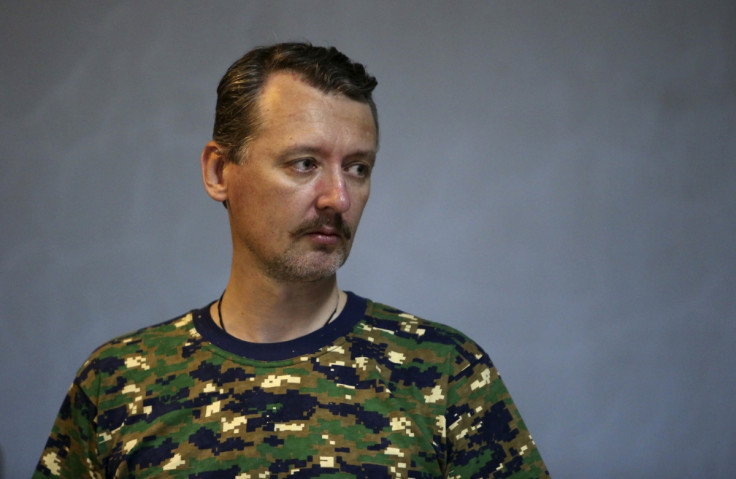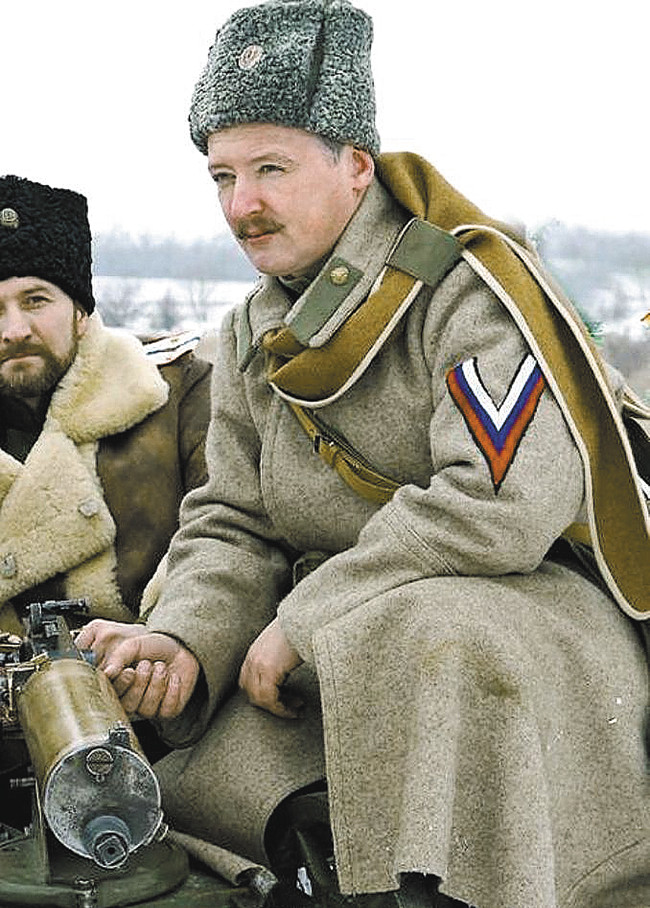Igor Strelkov's Bosnian Diary: Ukraine Separatist Leader's 1992 Bloody War

Evidence that a charismatic Russian separatist leader in eastern Ukraine was involved in the bloody Bosnian war of the early 1990s has come to light after he allegedly took responsibility for the downing of Malaysia Airlines MH17.
Igor Girkin, known by his pseudonym Igor Strelkov, is a veteran of both the Soviet and Russian armies and has been described as a covert agent of Russia's GRU military intelligence.
He has declared himself Minister of Defence of the self-proclaimed Donetsk People's Republic and was charged by Ukraine authorities with terrorism for acts during the current conflict.
On 25 July, Bosnian media published a picture of three men in military uniform in the eastern Bosnian town of Visegrad, where at least 3,000 Bosnian Muslims were massacred in the spring/summer of 1992, alleging Strelkov was one of them (although it is claimed the man is in fact Strelkov's friend and fellow soldier, Alexander 'Ace' Mukharev).
It is clear Strelkov played a prominent role in the war in Bosnia between November 1992 and April 1993. This is confirmed in a diary, published by Strelkov himself in 1999, in which he recounts his exploits fighting for General Ratko Mladic's VRS as part of the 2nd Russian volunteer corps.
But what do we know for sure about the role Strelkov played in the horrors of 1992?

Proud monarchist and history buff
Before joining the Serb forces, Strelkov reportedly fought in the Russian breakaway of Transnistria, inspired by an ideological zeal dating back to his days at the Moscow State Institute for History and Archives.
Strelkov's university contemporary Aleksei Makarkin told the New York Times he "is a person who lives in the beginning of the 20th century", dreaming of a return of monarchism.
It is perhaps not a coincidence that Strelkov is known to be obsessed with Mikhail Drozdovsky, one of the military leaders of the anti-Bolshevik White Guard in the Russian Civil War, and has a hobby of dressing in clothes from the period.

The Tsar's Wolves
Strelkov fought in Bosnia as part of a group of Russian monarchists known as the Tsar's Wolves, under the command of Mukharev.
In his diary, Strelkov appears to distance himself from the Serb atrocities committed in Visegrad, saying he wanted to fight on behalf of ordinary Serbs.
In Visegrad, Muslim men were rounded up and murdered; hundreds of women were detained and mass-raped at the spa, the infamous Vilina Vlas. Women, children and elderly people were locked in houses and burnt to death.
The diary is not the only evidence that Strelkov fought in Visegrad. A Russian book published in 2000 by Mikhail Polikarpov tells the story of Russian volunteers - mainly "ideological" monarchists, Cossacks, Communists and "lovers of war" - at the side of Serbs against Bosnians and Croats.
Describing the Wolves' first major operation behind enemy lines, Polikarpov writes: "The five Russians, armed to the teeth, ascended the height.
"An experienced soldier, 'Ace' [Mukharev] went into the action armed with an assault rifle with five magazines, a ton of loose rounds a sniper rifle.
"Igor [Strelkov] served as the artillery – his assault rifle was fitted with a grenade launcher."
In another episode, a Russian ambush of Bosniaks is told in detail:
Two Muslim fighters near the well were chopping wood and carrying water. They were separated by a field from the hidden "Ace" as well as two turn and a street. Suddenly both the "Turks" with assault rifles started approaching the exact spot where the Russian volounteer was hiding.
In a mixture of Russian and Ukrainian, Ace called to them "come here" and stood up pointing his rifle at them. The Muslims froze out of surprise. Their assault rifles were slung behind their backs and the sight of the enemy caught them off guard. One of them, white faced and wobbly-legged started walking towards Ace. The second suddenly starting running away.
The Russian fired a short round-two holes appeared in the back of the soldier. The second one ran after the first. Ace squeezed the trigger again and a burst of rounds tore bloody chunks out of the Muslim's back. Sasha [another member of the Tsar's Wolves] ran up and finished off one of the lying bodies.
Attacks and raids
In Strelkov's diary, Serb colleagues are depicted as cowards with no military discipline whose main objective is looting.
"The Russians have already seen that the Serbs lack the courage that distinguished their compatriots in World War I," Strelkov wrote.
Although he stresses that Muslim and Croats were no better in committing atrocities, the Serb forces did not make a good impression on Strelkov.
On one occasion, the Serbs let the Russians get into an exposed position and then postponed their own intervention.
Strelkov and his group had to withdraw under fire and took many casualties. The Russian fighter was very careful to express his relief that a grenade that landed near to a group of children didn't explode.
When the target village of Pretisha was finally captured, Strelkov described the looting of the village by about 70 Serb soldiers as "picturesque".
"A motley group dragged on the shoulder VCRs, TVs, a motorcycle, a Volkswagen battery, cattle," he wrote.
Suddenly they heard a noise, the enemy bullets started flying, the looters hid but eventually the enemy fire was silenced by two machine guns.
In another raid, the Russians accompanied the Serbs on a "scorched earth" attack on Tvrtkovici, in which the Serbs "do a bit of looting and then burn the village".
Strelkov returned to Russia in April 1993 and was clearly proud of his role in the war.
"We can only say that we are proud of our belonging to the... small but substantial contribution to the protection of Serbian Bosnia, preserving the traditions of Russian-Serbian military brotherhood," he wrote in the conclusion to his diary.
Ukraine
A fearsome figure, Strelkov has been called "one of the most powerful separatist figures in eastern Ukraine".
Combining militarism and ultra-nationalism in a sort of messianic aura, the Muscovite has reportedly imposed his will over the separatist militias that have assembled in Donetsk and Luhansk.
The shadowy rebel leader has also referred to his warfare past in Bosnia-Herzegovina when he warned Russian President Vladimir Putin against "an irreversible step down 'Milosevic's path".
On his VKontakte (Russia's equivalent of Facebook) page, Strelkov reportedly said Putin's reluctance towards armed groups seeking to set up a New Russia in Ukraine resembled Milosevic's fate.
The former president of Serbia "surrendered" military forces fighting for a "Greater Serbia" in Bosnia-Herzegovina and Croatia in the 1990s.
Milosevic "was later finished off in Kosovo, and finally 'expired' naturally, and tellingly, in The Hague" Strelkov's post read.
© Copyright IBTimes 2025. All rights reserved.






















